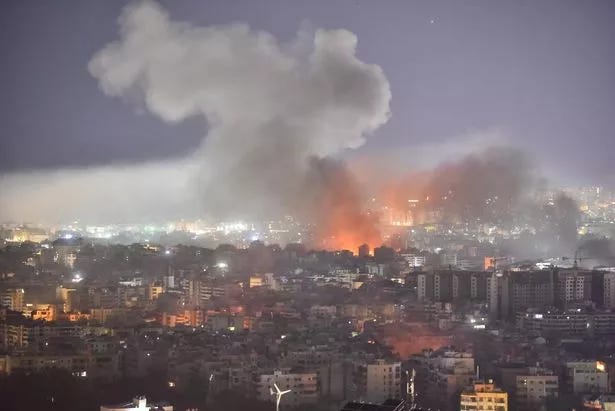Israel pounds Beirut with deadly airstrikes as Iran issues chilling signal for long-term war
Explosions rang out as Israeli aistrikes rocked Lebanon's capital - with The Middle East on a knife-edge for Israel’s promised revenge on Iran’s missile attack
Hello and welcome to Hostile World with Chris Hughes, a weekly newsletter about the world of defence and geopolitics. You can subscribe here and follow me on Twitter @defencechris. Thank you!

Israel pounded Beirut with devastating air-strikes on Friday as Iran’s Supreme Leader issued chilling signals his country is gearing up for long-term and bloody war.
Major blasts rang out in the capital’s south as troops hunted down militant leaders amid fears war in Lebanon will morph into a major war between Israel and Iran. The Middle East is on a knife-edge waiting for Israel’s promised revenge attack following Iran’s 180-strong missile salvo at its bitter enemy last Tuesday.
Fears of a wider war accelerated as US and British troops struck more than a dozen Iran-backed Houthi targets in Yemen on Friday, bombing weapons systems, bases and other equipment belonging to the Iranian-backed rebels. Many believe PM Benjamin Netanyahu may want to attack Iran’s nuclear sites in the belief that Israel must strike whilst Tehran’s proxy forces are under attack.
But Tehran’s defiant and gun-toting Supreme Leader Ayotollah Khamenei issued his first Friday prayers address in years boasting his country “won’t back down,” and even claiming: “Israel won’t last long.” Before thousands of worshippers the 85 year-old leader, an assault rifle at his side, issued a call to arms from "Afghanistan to Yemen and from Iran to Gaza and Yemen."

In a 40 minute rant, as Israel prepares for Monday’s grim October 7 year anniversary, marking the Hamas slaughter in southern of Israel which sparked the war, he said: "Our resisting people in Lebanon and Palestine, you brave fighters, you loyal and patient people, these martyrdoms and the blood that was shed shouldn't shake your determination…”
Even as he prepared for his speech Israel launched devastating blasts on Beirut, trying to kill the successor to Hezbollah’s leader Hassan Nasrallah, bombed to death a week ago. One massive midnight blast targeted a southern Beirut bunker where Hashem Safieddine was believed to be in hiding, although it is not yet known if he was killed.
Iran's foreign minister, on a visit to Beirut, warned Israel on Friday that if it carries out an attack on Iran, Tehran will retaliate in a harsh way. Abbas Araghchi was in Beirut for meetings with Lebanese officials three days after Iran launched at least 180 missiles into Israel, the latest in a series of rapidly escalating attacks that threaten to push the Middle East closer to a regionwide war. He said: "If the Israeli entity takes any step or measure against us, our retaliation will be stronger than the previous one."
Another strike hit the Lebanon-Syria border crossing, the Masnaa Border Crossing where tens of thousands fleeing war in Lebanon have fled into Syria. It is believed Israel is trying to plug a supply route into Lebanon from Syria through which Hezbollah is channeling fresh military supplies for their war on Israel.
Israel's military said Friday its fighter jets struck an underground tunnel between Lebanon and Syria and areas around a key border crossing used by many in recent days fleeing Israel's offensive. Strikes around the Masnaa Border Crossing effectively cut off the main highway linking Lebanon with Syria. Tens of thousands of people fleeing fighting in Lebanon have used the crossing into Syria over the past two weeks.
The military said that its fighter jets had struck the 2.17 miles underground tunnel between Lebanon and Syria because Hezbollah has used it to smuggle weapons from Iran and other proxies into the country. It said it struck the sites around the Masnaa border crossing because they were being used as militant infrastructure.
There are half a dozen border crossings between the two countries, most of which are still open. Hezbollah is believed to have received much of its weapons from Iran via Syria. UNHCR spokeswoman Rula Amin said the border crossing between Masnaa, Lebanon, and Jdaidit Yabws in Syria has been the main thoroughfare between the two countries, even though three other border crossings remain open.
Amin, a spokeswoman for UNHCR's Middle East and North Africa operations, also noted government figures that up to 1 million people have fled to places across Lebanon, and more than 185,000 have gone to Syria.
Speaking from Amman, Jordan, to reporters in Geneva on Friday, Amin said most of the nearly 900 government-established collective shelters in Lebanon were full, forcing many people to sleep in the open air -- including along Beirut's famed seaside Corniche. She said 60% of people who have crossed from Lebanon to Syria were children or adolescents, some of whom arrived alone.
The Israeli military said nine soldiers have died in the conflict in southern Lebanon. Four Israeli soldiers in the Golan heights were hit by a drone sent by pro-Iranian militia in Iraq amid fears Israel’s ground attack on Hezbollah is opening up a new front.

Israel and Hezbollah have traded cross-border fire almost daily since the day after Hamas' cross-border attack on Oct. 7, 2023, which killed 1,200 in Israel and took 250 hostage. More than 41,000 Gazan Palestinians have been killed in the ensuing war, just over half of them women and children, according to local health officials.
More than 2,000 people have been killed in Lebanon since then, most of them since Sept. 23, according to the Lebanese Health Ministry. US and British warplanes and warships bombed Houthi strongholds at roughly five locations. Houthi media said seven strikes hit the airport in Hodeida, a major port city, and the Katheib area, which has a Houthi-controlled military base.
Four more strikes hit the Seiyana area in Sanaa, the capital, and two strikes hit the Dhamar province. The Houthi media office also reported three air raids in Bayda province, southeast of Sanaa. The strikes come just days after the Houthis threatened "escalating military operations" targeting Israel after they apparently shot down a U.S. military drone flying over Yemen.
And just last week, the group claimed responsibility for an attack targeting American warships. The rebels fired more than a half dozen ballistic missiles and anti-ship cruise missiles and two drones at three U.S. ships that were traveling through the Bab el-Mandeb Strait, but all were intercepted by the Navy destroyers, according to several U.S. officials.
Houthis have targeted more than 80 merchant vessels with missiles and drones since the Israel-Hamas war in Gaza started last October. They have seized one vessel and sunk two in a campaign that also killed four sailors. Other missiles and drones have either been intercepted by a U.S.-led coalition in the Red Sea or failed to reach their targets, which have included Western military vessels.
The group has maintained that they target ships linked to Israel, the U.S. or the United Kingdom to force an end to Israel's campaign against Hamas in Gaza.
Thank you
I hope you’ve enjoyed my latest newsletter. If you have been forwarded this email and would like to sign up, you can do that right here.
Let me know your thoughts in the comments and see you next week,
Chris




